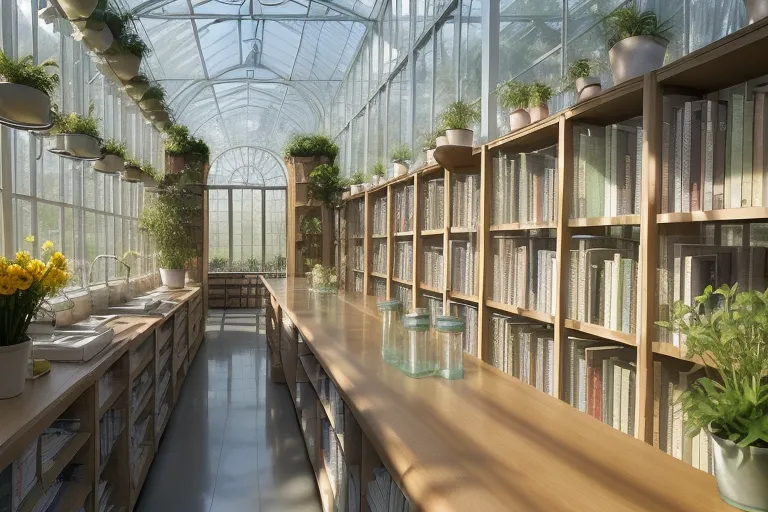The Oak Edition
It was Saturday. The dense row of oak trees was barely visible within the enormous greenhouse. Half a kilometre in diameter, the structure, glass and steel stood silently, protecting. A closed ecosystem - climate controlled, and their care; completely automated. They were the latest generation of the soil.
They were immense, slow growing features of the greenhouse, and likely had centuries to grow to reach the top of the glass dome. They would be felled one day, by children not yet conceived.
And on that day, scholars would gather, bicker and review all literary works published since the trees were but seeds in the soil, and only the finest stories would be imprinted.
Alongside this immense greenhouse, and the patience of centuries, a comparatively small boutique sat. The baren soil surrounding it was intersected by a spiralling, meandering, paved, golden path. This is where the stories are sold.
Behind panes of clean, gleaming glass, a neat row of bookshelves sat, drenched in the afternoon sun. On each shelf, tidy rows of books. Each had a thin layer of plastic to preserve the pages from decay and contamination.
Several samples sat on the counter, between two young women. The one behind the counter wore a floral, summery dress. Its swirling patterns interrupted by a name badge. Natasha.
Natasha had impeccable presentation - a soft, round; bohemian face; and manicured hands. It was important to keep good hands in her line of work - people would not buy mishandled books. She had been in this industry for a brief period and was good at her craft. She intended see out her days doing it.
Natasha spoke to her customer. A sharp featured blonde, wearing a bronze turtleneck – clearly woven from the fine fibers of a plant now extinct, its name forgotten.
It was clear her customer dripped with wealth, or gave the distinct, and convincing impression of it.
"This one's a lovely read. We use the pulp of the French oak to help deepen the sense of mystery and intrigue. The trees are felled in the winter; rare as that may be, yet it ensures a soft; earthy aroma in every page. This ensures that this tale remains connected to the land."
The customer blinked beneath her glasses, her hand moving ever so slightly across the textured page of the demonstrator novel. She exhaled. The paper was exquisite. It was fresh, crisp, sharp. Non-recycled and valuable.
"Will it archive well?"
"Before final packaging, the typeface pigment stabilises under filtered light, through centennial glass."
The customer was curious, and enquired further; "What was the production volume?"
"For this edition, only two hundred were produced in French oak."
"And, of the other pulps?"
"Five editions, in total, each with two hundred copies. French Oak, Pine, Hemlock, Birch, or recycled. Our recycled pulps via distributors only. French Oak and Hemlock are available only from our studio."
“And the narrative?”
Hemlock was the most sought after of the editions for tales such as the one she was considering and had the price-tag to match. The woman couldn’t buy something like that, yet. The French Oak would have to do.
"I'll take one of the French Oaks," she said, considering her choice. It would prove a fine read and heirloom.
"Excellent choice."
The transaction was completed in short order, and a copy of the book was packaged tightly, destined to sit in a high, dark place until such a time that it would be enjoyed.
That day would come. While archival, limited run books had significantly benefited from advancements in preservation technology and were desired artefacts; this item, with all the intrinsic care and skill put into its production, would start to decay the moment it was freed from its packaging and appreciated.
However, only through its appreciation, it would be set upon the path to its inevitable decay.
 AI-gen image
AI-gen image
Author's Notess:
This is a story that I fathomed some time ago. An earlier version was published on this platform previously. This one is refined and enriched with a bit more detail, to try and build a more detailed world.
The setting is meant to be Earth, near future, where the very notion of cutting down trees to print books on the paper from their product is absurd. The idea was brought to me when thinking of the treatment that customers get at winery cellar doors - where as much of the production process and intrinsic-ness of the winemaking process, the soil, the barrels, the time the grapes are harvested, etc (ad naseum) all influence the final outcome. I also wanted to touch upon some thoughts I had about photography (which I often have, long and plentiful) - where there exists a strange paradox. Conventional photographs created through a wet process (exposing the negative onto paper, then developed, stopped, and fixed, chemically) - thrive by being archived in an environment where they are not displayed, because as the chemistry breaks down due to exposure (ha!) to light and UV, it degrades the image. Meanwhile, digital images are only seen to survive (socially) - through them being seen again and again. As a result, I wanted to tug on the emotional heart strings of people who instill value into physical objects - sentimentalists, if you will - to feel some sort of guilt. if you open it, it will decay. If you appreciate it, you must absolutely accept that your love and appreciation of an object (or indeed a person) - will ultimately be in vain - because all things will fall victims to the forces of entropy and decay. Please, please, provide me with your criticism and feedback. I want to write an anthology of short stories, and this is just the first My gratitude for @riverflows is immense, for their incredible critique of a first version of this text.